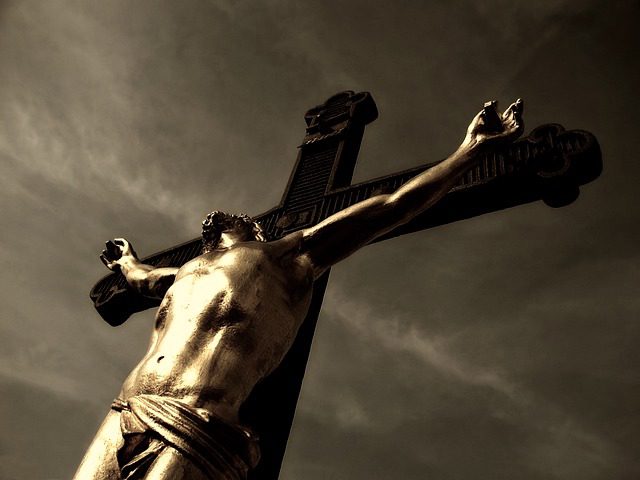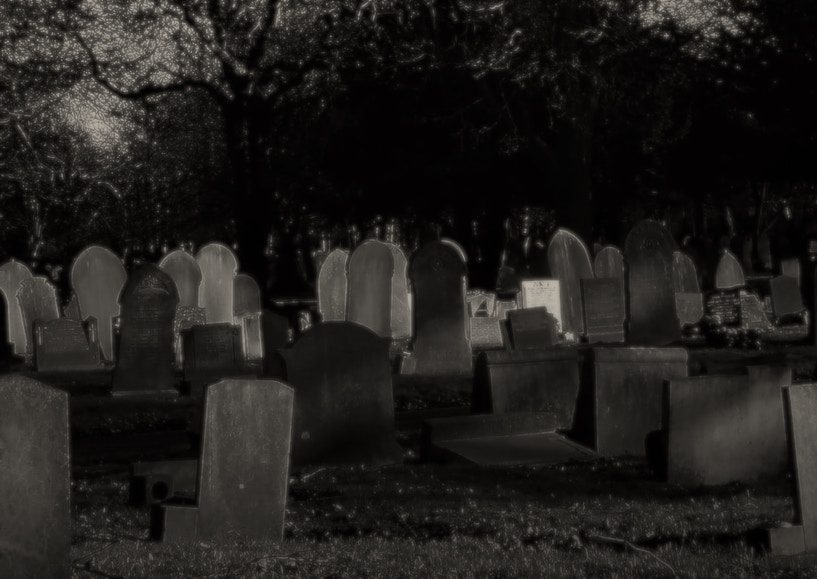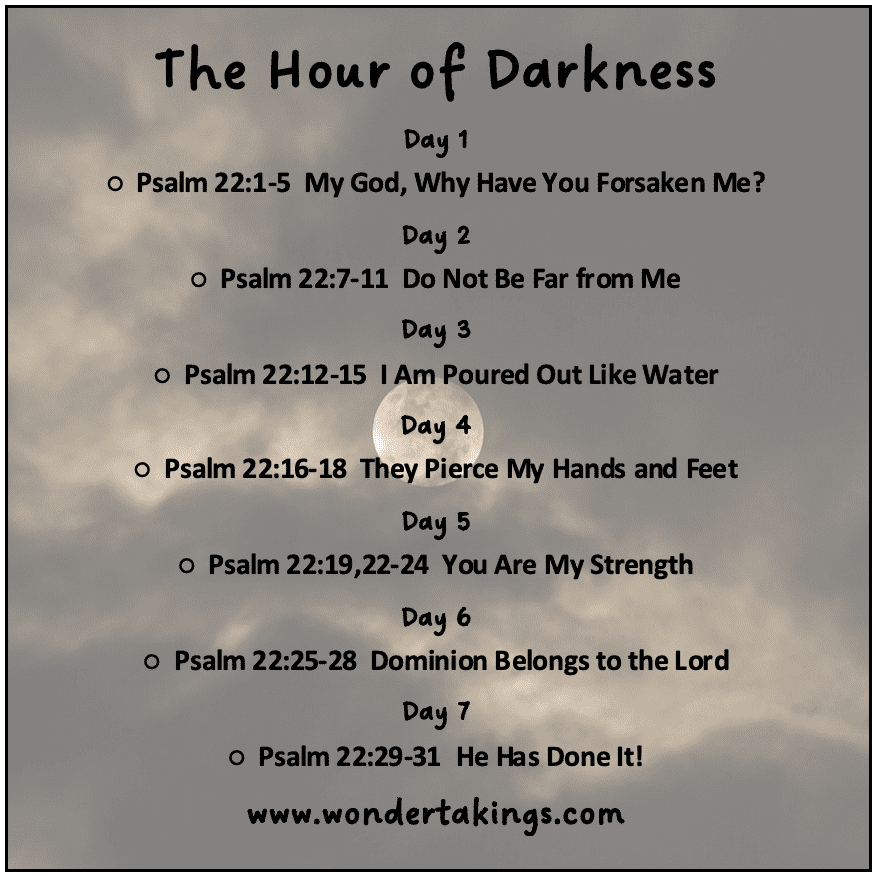The Hour of Darkness
“Jesus knew that the hour had come for him to leave this world and go to the Father.”
John 13:1 NIV

“Then Jesus went with his disciples to a place called Gethsemane . . .”
Matthew 26:36 NIV
I’m a little behind schedule with my blog post this week, but maybe it’s just as well. As I’m writing this, it’s October 31 — Halloween — and that seems fitting. Because this post covers some very scary things: darkness, fear, blood, torture, death, terrifying supernatural events, and even the dead rising from the grave. But the most horrible of all? A feeling of being abandoned by God.
“Here we see Jesus plumbing the uttermost depths of the human situation, so that there might be no place that we might go where he has not been before.”
William Barclay

“‘Father, if you are willing, please take this cup of suffering away from me. Yet I want your will to be done, not mine.’ Then an angel from heaven appeared and strengthened him. He prayed more fervently, and he was in such agony of spirit that his sweat fell to the ground like great drops of blood.”
Luke 22:42-44 NLT
If we’ve ever wondered if Jesus understands what it’s like to be afraid, we find the answer in the Garden of Gethsemane. As Jesus prayed through the night to be spared the horrors that awaited Him, He was in such anguish that “his sweat fell to the ground like great drops of blood.” Whether this means He was sweating so much that his sweat looked like blood, or it means Jesus was suffering from hematidrosis, a rare condition that occurs when the blood vessels surrounding the sweat glands rupture, the point is clear: Jesus was suffering great emotional distress. He was anxious. He was alone (since His disciples couldn’t stay awake). And He was praying for relief. Because Jesus knew what was coming. Yet even under this kind of unfathomable stress, Jesus still said, “Thy will be done.”
“What was the nature of the agony which appalled the mind and tortured the body of Jesus in Gethsemane it is, perhaps, impossible for man to know. That a sinless Being should have any contact with sin . . . and, further, should be loaded with sin . . . and, most dreadful of all, should be constituted sin . . . must have been unspeakable agony. Hebrews [5:7] . . . , and several of the Psalms, support the belief that the horror of being forsaken by God . . . and cast into hell was so great that He could not, as a man, have endured it but for added angelic strength . . . ; yet there was no antagonism between His independent will and the will of the Father.”
George Williams, The Student’s Commentary on the Holy Scriptures

“At noon, darkness fell across the whole land until three o’clock. At about three o’clock, Jesus called out with a loud voice, ‘Eli, Eli, lema sabachthani?‘ which means ‘My God, my God, why have you abandoned me?'”
Matthew 27:45-46 NLT
Through the beatings, flogging, and crucifixion itself, Jesus suffered great physical pain. That was horrible enough. But the emotional trauma of being abandoned by God as He had the sins of the world cast upon Him had to have been infinitely worse. I can’t even imagine this. None of us can. That was the whole point of Jesus suffering in our place, so that we would never have to face this separation from God.
When we think about martyrs, we usually think of their brave resolve to meet their fate while relying on the strength of God to get them through it. But Jesus was denied that. He wasn’t a martyr — He was a Sacrificial Lamb. He received the punishment we deserved. And the punishment for sin is eternal separation from God.
“For those made to suffer crucifixion, death itself was the only resolution. So Jesus waited that day, along with two other victims and a crowd of onlookers, for death to overcome him. Before that, however, a deeper pain was coming. A pain that went far beyond the nails in his feet and hands, the labored breathing or the ‘crown’ of thorns puncturing his brow. God poured out humanity’s rightful punishment for sin upon his Son. And even the physical elements trembled.”
The Story

“Jesus again gave a loud cry and breathed his last. Then the curtain hanging in the Temple was torn in two from top to bottom. The earth shook, the rocks split apart, the graves broke open, and many of God’s people who had died were raised to life. They left the graves, and after Jesus rose from death, they went into the Holy City, where many people saw them.”
Matthew 27:50-53 GNT
How much worse could things get? As those who loved Him and those who believed in Him looked on, it seemed that all was lost. I can imagine His followers holding on to hope for a last-minute miracle, sure that God would save Him from this horrible death. But then they heard Jesus Himself cry out asking why God had abandoned Him. Their faith must have been thoroughly shaken. Mine sure would have been.
But that wasn’t the last thing Jesus said. With His dying breath, Jesus cried, “It is finished!” And then God showed His power. The earth shook. Graves opened. And the curtain in the Temple was torn in two. What was happening? I’m sure at the time, no one understood what was going on, not even Satan himself, who had probably been feeling pretty confident in himself up to this point. But he didn’t know what Jesus knew: God’s plan wasn’t about saving Jesus from death on the cross. It was about saving all of us from eternal death. And the devil played right into God’s hand. Just like a last-minute plot twist in an exciting movie, the villain had the tables turned on Him. And what looked like the Hero’s defeat was actually His victory! The true nature of this victory would be revealed later, but here we see the first clue that God’s plan had been executed to perfection and death was finally defeated.
“John tells us that Jesus died with a shout: ‘It is finished’ (John 19:30). . . . [It] is the victor’s shout; it is the cry of the man who has completed his task; it is the cry of the man who has won through the struggle; it is the cry of the man who has come out of the dark into the glory of the light, and who has grasped the crown. So, then, Jesus died a victor with a shout of triumph on his lips.”
William Barclay
As Christians, we already know what comes next. And we often like to fast forward to the happy ending of Jesus’ resurrection and our salvation. But before we rush toward the light, let’s take a moment and appreciate the lessons that can be learned in the darkness. From Jesus’ experiences just before His death, we learn that He understands pain and emotional agony, so we can always turn to Him for understanding when we are suffering. We learn that we can cry out to God when we need help to carry on. We see that following Christ’s example in our own lives means laying down our will, and praying for God’s will to be done, no matter what. We also learn that we can trust in God, no matter how dark things seem — even if we feel abandoned by Him — because He always has a plan. And that plan leads to victory!
This week’s Scripture passages all come from Psalm 22, a psalm of David that mysteriously parallels the crucifixion story. It begins with, “My God, my God, why have you forsaken me?” (Psalm 22:1 NIV), but it ends triumphantly in praise. It is a song of trust and confidence in God. It is a song that celebrates God’s power over everything. It is a song that looks toward the future and predicts what we, as Christians, now know: “The Lord has saved us!” (Psalm 22:31 CEV)

“Here is the precious thing. Jesus passed through the uttermost abyss, and then the light broke. If we too cling to God, even when there seems to be no God, desperately and invincibly clutching the remnants of our faith, quite certainly the dawn will break and we will win through. The victor is the man who refuses to believe that God has forgotten him, even when every fibre of his being feels that he is forsaken. The victor is the man who will never let go of his faith, even when he feels that its last grounds are gone. The victor is the man who has been beaten to the depths and still holds on to God, for that is what Jesus did.”
William Barclay

References:
- Barclay, William. The Gospel of Matthew. Rev. ed., vol. 2, The Westminster Press, 1975.
- Frazee, Randy. The Heart of the Story: Discover Your Life Within the Grand Epic of God’s Story. Zondervan, 2017.
- The Story: Read the Bible as One Seamless Story from Beginning to End. Rev. ed., Zondervan, 2008.
- Williams, George. The Student’s Commentary on the Holy Scriptures. Kregel Publications, 1981.
Images:
- Moon and Clouds featured image by Pexels from Pixabay
- Tree image by veeterzy: https://www.pexels.com/photo/green-leafed-tree-38136/ (edited)
- Blood Moon image by D Mz from Pixabay
- Crucifixion image by Jiří Rotrekl from Pixabay (edited)
- Cemetery image by Attila Lisinszky on Unsplash (edited)
- Sunrise image by Ivana Cajina on Unsplash